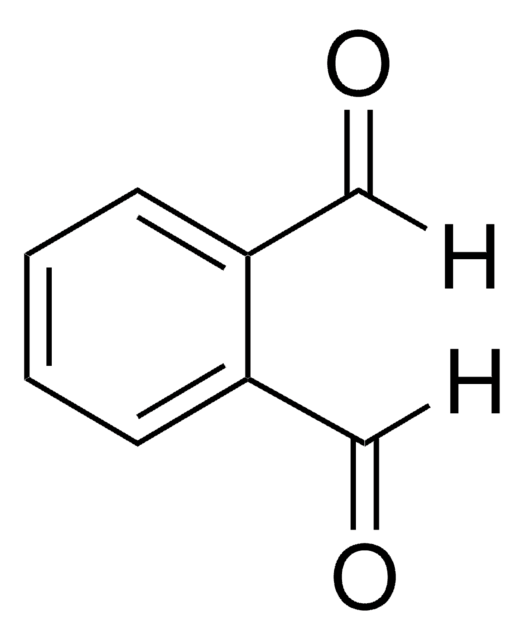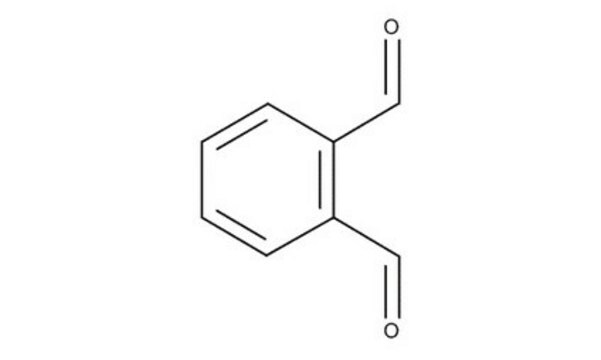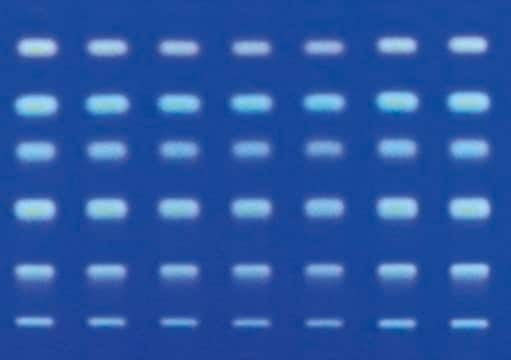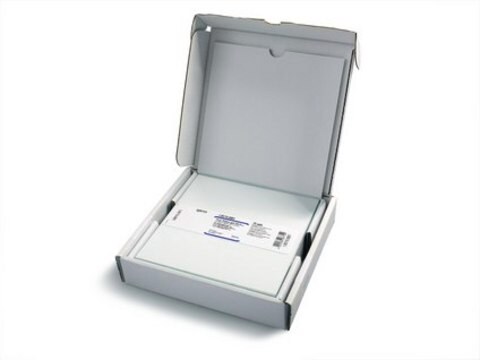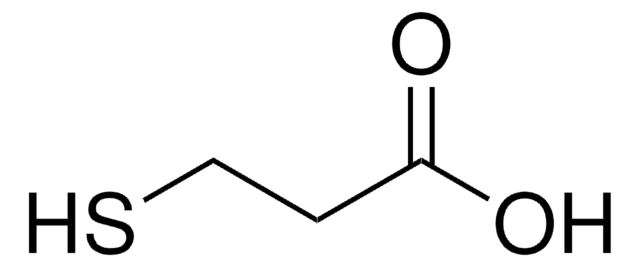추천 제품
Quality Level
양식
solid
autoignition temp.
480 °C
효능
178 mg/kg LD50, oral (Rat)
>2000 mg/kg LD50, skin (Rat)
pH
7 (20 °C, 53 g/L in H2O)
bp
83-84 °C/1 hPa
mp
52-58 °C
전이 온도
flash point 132 °C
solubility
53 g/L
density
1.13 g/cm3 at 20 °C
벌크 밀도
530 kg/m3
저장 온도
2-30°C
InChI
1S/C8H6O2/c9-5-7-3-1-2-4-8(7)6-10/h1-6H
InChI key
ZWLUXSQADUDCSB-UHFFFAOYSA-N
애플리케이션
- Combined techniques for revealing the mechanism beneath the inhibition effects of pectin on gluten digestibility using static in vitro gastro-duodenal protocols.: This study uses a combination of techniques to explore how pectin affects gluten digestibility, providing insights into the interaction of phthaldialdehyde derivatives with gluten proteins (Lin et al., 2024).
- Analysis of Gizzerosine in Foodstuffs by HPLC Involving Pre-column Derivatization with o-Phthaldialdehyde.: This research develops a method using HPLC with pre-column derivatization involving phthaldialdehyde to analyze gizzerosine in foodstuffs, demonstrating the compound′s utility in food safety studies (Li and Wu, 2024).
- Comprehensive studies on the development of HPLC-MS/MS and HPLC-FL based methods for routine determination of homocysteine thiolactone in human urine.: This study develops and validates methods using phthaldialdehyde derivatives for the determination of homocysteine thiolactone in human urine, contributing to clinical diagnostics and biochemical research (Piechocka and Głowacki, 2024).
- Smart-detection approach for protein residues to evaluate the cleaning efficacy of reusable medical devices.: Utilizing phthaldialdehyde for protein residue detection, this study provides a smart detection approach to improve the cleaning efficacy of medical devices, enhancing patient safety (Ouirungroj et al., 2024).
- One-pot sample preparation procedure for the determination of protein N-linked homocysteine by HPLC-FLD based method.: This research presents a novel one-pot sample preparation method using phthaldialdehyde for determining protein N-linked homocysteine, advancing analytical techniques in protein chemistry (Piechocka and Głowacki, 2023).
분석 메모
Purity (GC): ≥ 99 %
Identity (IR): conforms
Melting point: 54 - 58 °C
Fluorescence (340 nm, 0,8 g/l, ethanol, as quinine): ≤ 2 ppb
Phthalic acid (TLC): ≤ 0.5 %
Nitrogen compounds (as N): ≤ 0.05 %
Identity (IR): conforms
Melting point: 54 - 58 °C
Fluorescence (340 nm, 0,8 g/l, ethanol, as quinine): ≤ 2 ppb
Phthalic acid (TLC): ≤ 0.5 %
Nitrogen compounds (as N): ≤ 0.05 %
신호어
Danger
유해 및 위험 성명서
Hazard Classifications
Acute Tox. 3 Oral - Aquatic Acute 1 - Aquatic Chronic 1 - Eye Dam. 1 - Skin Corr. 1B - Skin Sens. 1 - STOT SE 3
표적 기관
Respiratory system
Storage Class Code
6.1A - Combustible, acute toxic Cat. 1 and 2 / very toxic hazardous materials
WGK
WGK 3
Flash Point (°F)
269.6 °F - closed cup
Flash Point (°C)
132 °C - closed cup
시험 성적서(COA)
제품의 로트/배치 번호를 입력하여 시험 성적서(COA)을 검색하십시오. 로트 및 배치 번호는 제품 라벨에 있는 ‘로트’ 또는 ‘배치’라는 용어 뒤에서 찾을 수 있습니다.
이미 열람한 고객
자사의 과학자팀은 생명 과학, 재료 과학, 화학 합성, 크로마토그래피, 분석 및 기타 많은 영역을 포함한 모든 과학 분야에 경험이 있습니다..
고객지원팀으로 연락바랍니다.